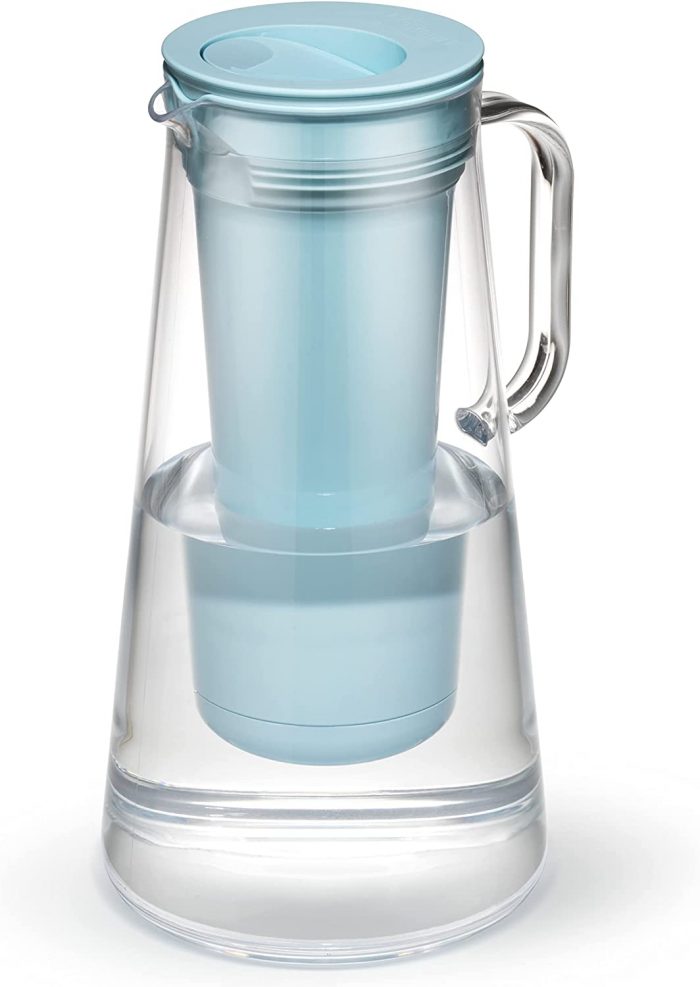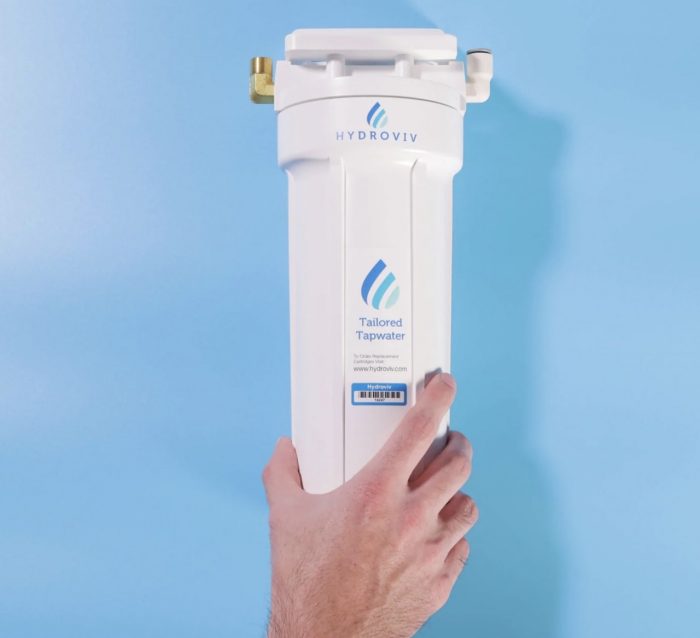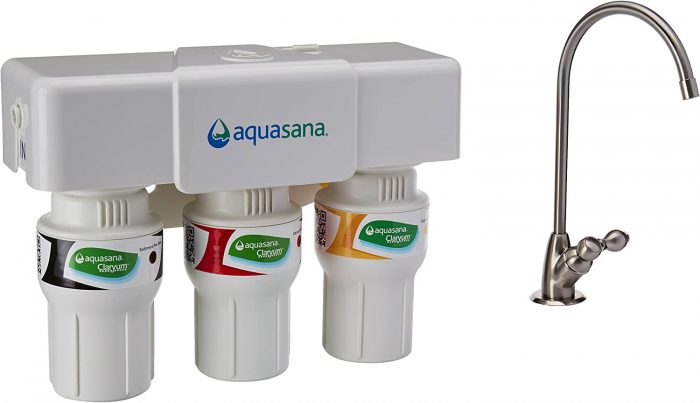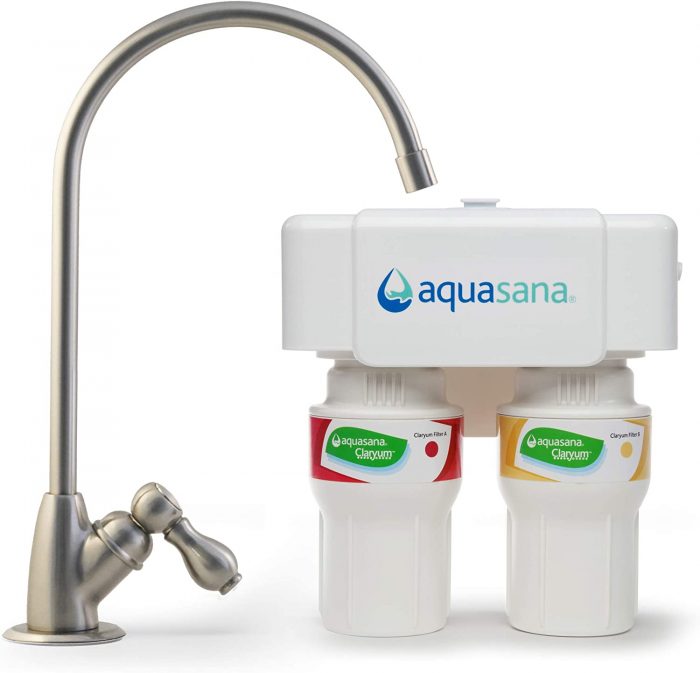Don’t need any info? Quick recommendations here:
| Filter | Type | NSF 42 | NSF 53 / NSF p473 | NSF 401 |
| LifeStraw Pitcher (glass) | Pitcher (glass to avoid microplastics) | Yes | Yes | Yes |
| Aquasana 2-stage | Under-sink with faucet | Yes | Yes | Yes |
| Aquasana 3-stage | Under-sink with faucet | Yes | Yes | Yes |
| Aquasana 3-stage max flow | Under-sink with faucet | Yes | Yes | Yes |
| Hydroviv | Under-sink, works with existing faucet | Yes | Yes | No |
Why your water may not be safe, and why I wrote this post!
I care a lot about health, but find there is a fine line between products that actually can help protect your health, and those that are nearly straight up fraud (such as many supplement claims). For a long time I believed that tap water was quite safe and filtered heavily due to the use of chlorine dioxide, but recent studies have shown that chemicals from perfluorooctanoic acid (known as PFOAs) are way riskier than previously thought.
(1) First, most thought PFOAs weren’t common in our water supplies, but new studies have shown them all over US cities. I decided to pick up a filter because they were discovered near me in the DC area. Here is EWG’s PFOA contamination map. This is just a start of what’s been discovered – probably many more places are impacted.
(2) Worst of all, we’ve basically been lied to. New science is being show that PFOAs are as much as 1000x more dangerous than previously thought. Even incredibly tiny doses are causing health issues.
EPA Study, June 15th, 2022: Drinking Water Health Advisories
Human studies have found associations between PFOA and/or PFOS exposure and effects on the immune system, the cardiovascular system, human development (e.g.,decreased birth weight), and cancer.
The new recommended levels are tiny, on the order of parts per trillion (I’m not making this up):
Interim updated Health Advisory for PFOA = 0.004 parts per trillion (ppt)
• Interim updated Health Advisory for PFOS = 0.02 ppt
• Final Health Advisory for GenX chemicals = 10 ppt
• Final Health Advisory for PFBS = 2,000 ppt
What can we do about this?
The trouble with most water filters on the market today is that the basic ones mostly only filter for taste. When it comes to filters, the best thing to do is simply look at the NSF ratings for each filter. Below are the ones that you should care about:
- NSF 42 – this is the most basic rating that covers aesthetics such as odor and taste. These filters remove some chlorine and chloramines. Pretty much every basic filter covers this standard (Brita filters, etc), but it doesn’t do anything to protect against more dangerous chemicals
- NSF P473 – this was the pre-certification rating used before the final NSF 53 rating came out that covers PFOAs. On some models you’ll see this listed, on others it will simply appear as NSF54.
- NSF 53 – covers heavy metals (such as lead, mercury, chromium iii, cadmium, copper), bacteria like Giardia and Cryptosporidium (“crypto”), herbicides and pesticides, benzene, radon, PCBs, MTBE, and trihalomethanes. This includes PFOAs as well now, as mentioned above.
- NSF 401 – covers “emerging chemicals” and is a newer standard to catch things like flame retardants, prescription drugs, detergents, and certain herbicides and pesticides. Every manufacturer though can cover a different range of these chemicals.
Which filters do you recommend?
The main thing to make sure is that your filters have an NSF rating, and at a minimum have the NSF P473 or NSF53 rating. Only NSF42 alone is barely any coverage at all. NSF 401 will add some extra protection, but varies wildly on what is covered between manufacturers.
Here are some of the filters I’ve found that I trust based on (a) actual NSF ratings, (b) years established as a company, (c) usage by large non-profit organizations or governments
Water Pitchers
There are many out there, but after much research, I simply recommend the Lifestraw Pitcher. Why? It’s a super well trusted brand, it’s affordable, and it covers all of the ratings. I’m not even going to recommend others because they charge more and do the same thing, and have less of a reputation. I personally bought one of these for myself.
The 7-cup BPA free plastic pitcher is the most affordable. You can splurge a bit more if you want a 10cup model or a glass model. (Note that if your faucet isn’t very high the 7c model is shorter and easier to fill).
LifeStraw 7-cup Water Pitcher: https://amzn.to/43OSKOY

Under sink options
In my opinion, there are 2 brands that you should consider: (1) Aquasana, if you have an extra hole in your countertop, or are willing to cut one for the extra faucet, or (2) Hydroviv, if you don’t want to update your countertop, for example if you are in a rental apartment.
Hydroviv
This company creates a filter that is custom to your geographic area. They are fully NSF53 certified, though not NSF401 yet. I don’t own one of these, but my sister does, and I can attest that the water tastes good, and the flow rate out of her primary kitchen sink is surprisingly good with this filter inline.
Buy the Hydroviv water filter here

Aquasana
Aquasana has created water filters for a LONG time. Here I recommend 2 variants: the 3-stage version has an extra sediment filter if you are areas with more difficult water. For most the 2-stage version is probably fine, but the cost difference is negligible if you want it. They also offer larger “max flow” filters, but reviews weren’t as good on those, and they are more expensive, so I’m recommending the basic models for most instead.
Aquasana 3-stage under counter Claryum system

Aquasana 2-stage under counter Claryum system
A bit cheaper than the 3-stage model, this would probably work for most people.
